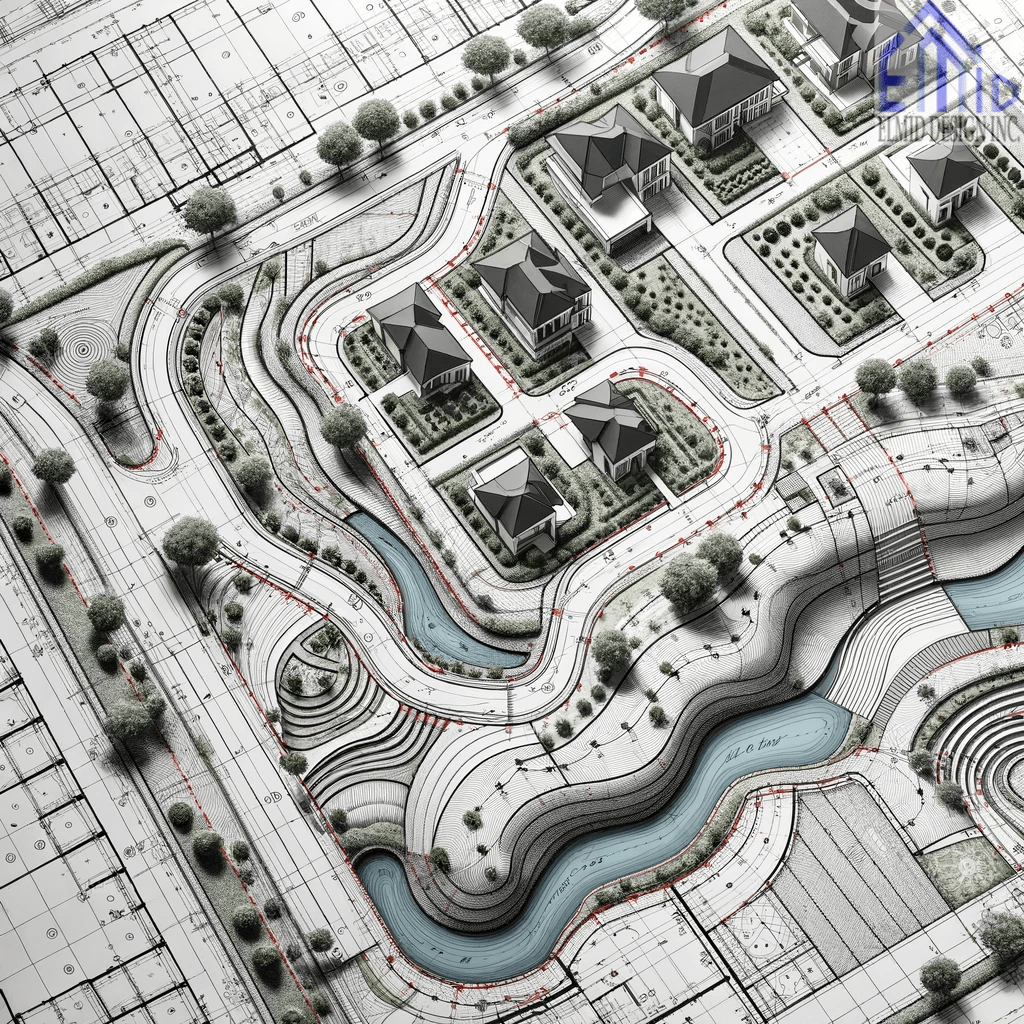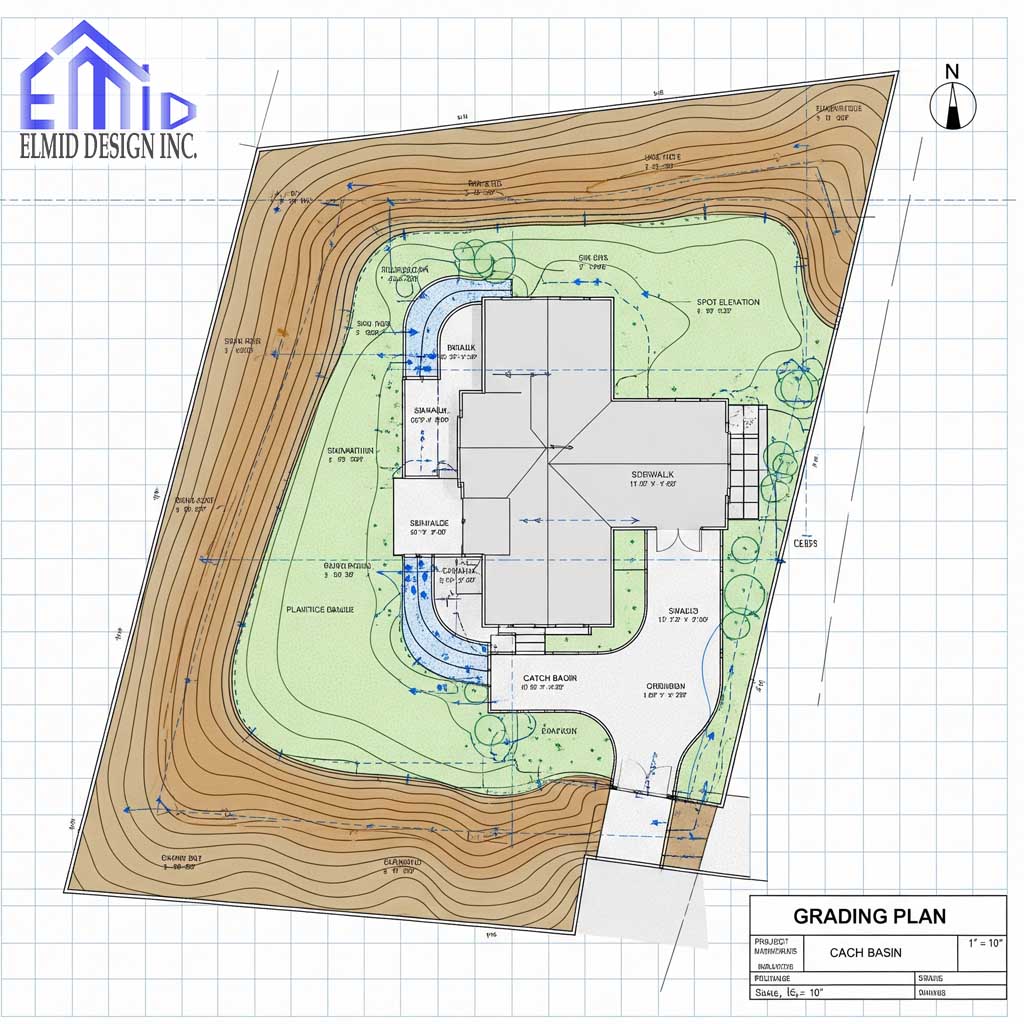A grading plan Orangeville is an essential requirement for property development, home additions, and commercial projects within the town. It defines how land will be shaped to ensure proper drainage, structural safety, and compliance with local by-laws. Without a detailed grading plan, building permit applications risk delay or rejection. The Town of Orangeville requires that proposed elevations, slope patterns, and drainage flows be mapped before construction begins. These requirements protect both homeowners and surrounding properties from flooding, erosion, and long-term damage. This article explains what a grading plan is, why Orangeville enforces strict rules, how developers can navigate compliance, and how licensed firms like Elmid Design Inc deliver accurate designs that streamline approvals and protect property value.
What Is a Grading Plan in Orangeville?
A grading plan in Orangeville is a technical drawing prepared by a professional engineer or qualified consultant. It shows the existing ground elevations and the proposed changes needed to direct water safely away from structures. These plans include drainage paths, swale locations, driveway slopes, and finished foundation heights. The purpose is to manage water flow effectively and prevent issues such as pooling, flooding, or runoff onto neighboring properties. In Orangeville, grading plans form part of site plan approvals or building permit applications. The Town’s design guidelines ensure that every project maintains safety, environmental protection, and neighborhood stability. Without a proper grading plan, construction cannot begin, and municipal officials will withhold permits until compliance is achieved.
Orangeville’s Regulatory Framework
The Town of Orangeville enforces a clear regulatory framework for grading plans. Developers must follow both the Site Plan Approval Design Guidelines and the Site Alteration By-law. These documents outline when a grading plan is required and what information must be included. For example, any project involving fill placement, topsoil removal, or slope changes falls under the Site Alteration By-law. The building permit process also mandates grading plans for additions, decks, garages, and significant renovations. Elevations must meet prescribed limits to protect drainage patterns and neighboring properties. Licensed professionals are expected to prepare or review these submissions, adding accountability and ensuring accuracy. By combining provincial building code requirements with municipal by-laws, Orangeville establishes a strict but transparent framework that safeguards public safety while supporting responsible development.
Key Components of an Orangeville Grading Plan
An Orangeville grading plan must show specific details to meet municipal approval. Existing and proposed elevations are clearly marked to distinguish natural ground levels from planned changes. Drainage arrows indicate how water will move across the property, while swales are identified with slope percentages to confirm compliance. Plans also display driveway gradients, finished foundation heights, and locations of retaining walls if required. Fill details, including depth and compaction standards, may also be requested under the Site Alteration By-law. A proper legend and north arrow are included for clarity. Each of these components ensures inspectors and contractors understand how the site will be shaped during construction. A well-prepared grading plan acts as both a regulatory submission and a practical construction guide, reducing the risk of disputes, errors, or unsafe conditions.
Why Compliance Matters in Orangeville
Compliance with grading standards in Orangeville is essential for permit approval and long-term property protection. If a plan does not meet municipal standards, the Town will return it with comments or reject the permit application entirely. Beyond approval, non-compliant grading can lead to severe consequences. Improper drainage may damage foundations, flood basements, or erode landscaped areas. It can also push water onto neighboring properties, creating legal disputes and liability concerns. Compliance reduces these risks and ensures projects align with sustainable development principles. Developers who respect grading regulations build trust with municipal authorities and future homeowners. By meeting the Town’s expectations from the start, projects avoid delays, additional costs, and reputational harm. Compliance also strengthens resale value, as buyers recognize the long-term stability of a properly graded property.
How Elmid Design Inc Ensures Smooth Approvals
Elmid Design Inc is a PEO-certified engineering firm with proven expertise in preparing grading plan Orangeville submissions. Their team understands the Town’s specific guidelines, by-laws, and approval process. They prepare detailed, accurate grading drawings that meet municipal standards and anticipate potential reviewer comments. By using advanced technology such as CAD modeling and GIS mapping, they ensure plans are precise and efficient. Elmid Design Inc also coordinates directly with Orangeville’s municipal staff, streamlining communication and reducing revision cycles. Their certificate of authorization from Professional Engineers Ontario guarantees accountability and professional oversight. For developers and homeowners, this means fewer delays, faster approvals, and long-term protection from drainage issues. With Elmid Design Inc, grading plans become more than just a permit requirement—they become a safeguard for project success.
Key Takeaways
A grading plan Orangeville is a mandatory step in securing building permits and ensuring proper site drainage. The Town enforces strict guidelines through its Site Plan Approval process and Site Alteration By-law. These plans must include detailed elevations, slopes, swales, and drainage patterns to prevent flooding and property disputes. Non-compliance delays permits and creates costly risks for developers and homeowners. Working with licensed professionals like Elmid Design Inc ensures accuracy, compliance, and smoother approvals. Their expertise and certification from Professional Engineers Ontario make them a trusted partner in Orangeville development. For any construction project, a well-prepared grading plan is the foundation of safety, compliance, and long-term property value.

Challenges in Orangeville Grading Plan Projects
Developers in Orangeville often face unique challenges when preparing grading plans. Infill developments can be difficult because surrounding properties already have established grading and drainage systems. Introducing new slopes must not interfere with existing patterns, and this creates design limitations. Projects that involve significant fill placement may trigger additional reviews under the Site Alteration By-law, requiring more documentation and inspections. Seasonal conditions also complicate grading. Heavy rainfall, freeze-thaw cycles, and soil compaction all influence how drainage systems perform. Even small mistakes in slope calculations can cause water pooling or soil erosion. Municipal reviewers look closely at these details and frequently request revisions if inconsistencies appear. To overcome these challenges, developers must work with qualified professionals who anticipate problems early and design compliant, practical solutions that meet both municipal expectations and site conditions.
Case Study: Residential Addition Requiring Grading Plan
A recent residential addition in Orangeville highlighted the importance of a thorough grading plan. The property required a new garage, which significantly altered the site’s drainage patterns. The initial submission did not account for runoff flow between the garage and the house, leading to concerns from municipal staff about water pooling near the foundation. The developer worked with engineers to revise the plan by adjusting driveway slopes and adding a drainage swale along the property line. After resubmission, the Town approved the project without delay. This case demonstrated how quick revisions and professional expertise prevent long-term issues. It also showed the importance of anticipating drainage changes when expanding structures. With proper planning, the project proceeded smoothly, avoiding costly construction changes later. Elmid Design Inc regularly assists clients in these scenarios, preparing accurate plans that withstand municipal review and protect property value.
Best Practices for Developers in Orangeville
Developers in Orangeville can improve their chances of approval by following proven best practices. A comprehensive topographic survey should always form the foundation of a grading plan. Accurate data ensures that proposed elevations match existing conditions and avoid drainage conflicts. Foundation heights must remain elevated to prevent water infiltration and comply with municipal standards. Drainage swales should connect smoothly with municipal outlets, ensuring water flows safely without affecting neighboring lots. Engaging in pre-consultation with Orangeville’s planning staff can also streamline approvals by clarifying requirements before formal submission. Developers who rely on experienced engineering firms benefit from plans that anticipate municipal comments and minimize revisions. Elmid Design Inc emphasizes these best practices, providing clients with compliant, detailed, and efficient grading solutions that meet Orangeville’s standards. By following these approaches, developers avoid delays and ensure smoother project timelines.
Post-Construction Validation and Final Approval
In Orangeville, compliance does not end with the grading plan submission. After construction, inspectors confirm that the finished grading matches the approved drawings. This validation step protects both the property owner and the municipality by ensuring drainage systems function as designed. If deviations occur, developers must correct them before occupancy permits are issued. Site alteration work such as fill placement or topsoil removal may also require additional inspections under the local by-law. Municipal staff look for proper slopes, intact swales, and stable soil conditions during these inspections. Engineers often provide as-built drawings to demonstrate accuracy and accountability. Elmid Design Inc assists clients through this stage by verifying site conditions and providing certification when required. Their oversight ensures projects close without delays and homeowners enjoy long-term protection against drainage and erosion issues.
Stormwater Management in Orangeville Grading Plans
Stormwater management is an important aspect of grading plan Orangeville requirements. The Town emphasizes that surface runoff must not harm municipal infrastructure or neighboring properties. Engineers design systems that direct water into approved outlets while controlling flow during heavy rain. In some cases, infiltration systems or detention features are required to slow down runoff and reduce pressure on storm sewers. These features prevent flooding and support sustainable water use. A grading plan that ignores stormwater requirements will likely be rejected by municipal staff. Elmid Design Inc integrates stormwater modeling into every Orangeville project, ensuring that both functional drainage and environmental protection are achieved. By doing so, they help developers meet compliance standards while protecting communities from unnecessary water-related risks.
Zoning Impacts on Grading Plans in Orangeville
Zoning by-laws influence every grading plan in Orangeville. Setback rules, building height limits, and lot coverage restrictions all affect how land can be shaped. Residential zones may require specific yard setbacks that dictate swale placement or driveway alignment. Commercial developments may face stricter requirements for stormwater retention areas. Ignoring zoning regulations results in immediate rejection, no matter how technically sound the grading design appears. Developers must confirm zoning compliance before submitting their grading plans to the Town. This step avoids costly redesigns and delays. Elmid Design Inc incorporates zoning analysis into every plan to ensure all designs meet municipal standards. Their knowledge of Orangeville’s zoning rules provides clients with an advantage in achieving fast approvals and avoiding regulatory setbacks.
How Grading Affects Landscaping and Property Value
Grading impacts the long-term usability and value of properties in Orangeville. Proper grading ensures that water drains away from foundations, protecting basements and structural integrity. It also creates level, functional spaces for patios, gardens, and driveways. Poor grading often leads to erosion, standing water, or unusable outdoor areas, which decrease property appeal and resale value. Buyers increasingly recognize the importance of grading when assessing long-term costs and risks. For developers, well-designed grading enhances curb appeal and reduces homeowner complaints after construction. Municipal staff also consider landscape integration during grading plan review to prevent future drainage disputes. Elmid Design Inc prepares grading plans that balance technical drainage needs with aesthetic goals, helping property owners enjoy both safety and increased value. Their approach ensures that every project delivers lasting functionality and financial return.
Technology’s Role in Modern Grading Plans
Technology has transformed how grading plans are prepared in Orangeville. Engineers use UAV drones to gather topographic data with high accuracy and efficiency. Advanced CAD and GIS software allow for detailed slope modeling and stormwater simulations before municipal submission. These tools reduce design errors and highlight conflicts early, saving developers from costly rework. Technology also enhances communication with municipal staff by providing clear visuals and measurable data, which simplifies the approval process. Elmid Design Inc leverages these tools to provide precise and transparent grading plans for clients. Their combination of advanced technology and engineering expertise delivers consistent results that meet Orangeville’s expectations. By adopting innovative methods, they shorten approval timelines and strengthen compliance while providing sustainable designs. Technology ensures that grading plans are accurate, reliable, and ready for future challenges.
Conclusion
A grading plan Orangeville is more than a permit requirement. It is the foundation for safe, compliant, and valuable property development. Proper grading protects homes, directs water safely, and enhances property usability. The Town enforces strict guidelines through site plan approvals and by-laws, requiring professional oversight and technical precision. Developers who cut corners risk delays, costs, and long-term drainage problems. By working with licensed firms like Elmid Design Inc, property owners and developers secure accurate designs, smooth approvals, and lasting protection. Their expertise in municipal regulations, stormwater management, and modern design tools makes them a trusted partner in Orangeville. A well-prepared grading plan ensures both immediate project success and sustainable property value for the future.
FAQs About Grading Plan Orangeville
What role does stormwater management play in grading plans?
Stormwater management ensures water flows safely into approved systems without overwhelming municipal sewers or damaging nearby properties.
How does zoning affect grading plans in Orangeville?
Zoning dictates setbacks, building placement, and drainage allowances. Ignoring zoning rules can lead to rejected submissions and costly redesigns.
Why does grading influence property value?
Proper grading protects foundations, prevents flooding, and enhances landscaping potential. Poor grading reduces usability and lowers resale value.
What technology improves grading plan accuracy?
Engineers now use drones, CAD, and GIS modeling to create precise grading plans. These tools improve accuracy, compliance, and communication with the Town.
Why should developers choose Elmid Design Inc for Orangeville projects?
Elmid Design Inc is PEO-certified and experienced in Orangeville’s municipal requirements. Their precision, compliance expertise, and advanced tools secure faster approvals.

Elmid Design Inc: Leaders in Grading Plan Orangeville Services
Elmid Design Inc is a PEO-certified engineering firm specializing in grading plan Orangeville projects. With deep expertise in municipal by-laws, site alteration permits, and drainage design, their team delivers precise, permit-ready grading plans that meet the Town’s strict standards. Using advanced CAD and GIS tools, they create accurate designs that streamline approvals and prevent costly delays. Their certification from Professional Engineers Ontario ensures trust, accountability, and compliance. Developers and homeowners rely on Elmid Design Inc for professional grading solutions that protect property value, secure faster permits, and provide long-term site safety in Orangeville.
Geographic Locations That We Service:
Our Licensed Professional Engineers specializing in Engineered Site Grading Plans offer the best-engineered site grading plan, lot grading and erosion plan, and drainage plan to obtain site plan approval and building permits in Ontario, including a wide range of municipalities. Each area boasts unique features and requirements, making our tailored approach essential for success.
Toronto and Surrounding Areas
In the vibrant heart of Ontario, we service Toronto (City of Toronto) and surrounding areas. Additionally, we cover Oshawa (City of Oshawa), Pickering (City of Pickering), and Clarington (Municipality of Clarington). Furthermore, our expertise extends to Ajax (Town of Ajax), Whitby (Town of Whitby), Brock (Township of Brock), Scugog (Township of Scugog), and Uxbridge (Township of Uxbridge).
Halton Region
Moving to the Halton Region, our services encompass Burlington (City of Burlington) and Halton Hills (Town of Halton Hills). Also included are Milton (Town of Milton) and Oakville (Town of Oakville).
Peel Region
In the Peel Region, we provide services in Brampton (City of Brampton), Mississauga (City of Mississauga), and Caledon (Town of Caledon).
York Region
Our services in the York Region cover Vaughan (City of Vaughan), Aurora (Town of Aurora), and East Gwillimbury (Town of East Gwillimbury). We also cater to Georgina (Town of Georgina), Markham (City of Markham), Newmarket (Town of Newmarket), Richmond Hill (City of Richmond Hill), Whitchurch-Stouffville (Town of Whitchurch-Stouffville), King (Township of King), and Bradford-West Gwillimbury (Town of Bradford-West Gwillimbury). Each municipality here offers a distinct setting, requiring our specialized approach.
Other Southern Ontario Cities and Towns
We also serve many other cities and towns in Southern Ontario. These include Hamilton (City of Hamilton), St. Catharines (City of St. Catharines), Niagara on the Lake (Town of Niagara on the Lake), Brant (County of Brant), Cambridge (City of Cambridge), Kitchener (City of Kitchener), Waterloo (City of Waterloo), and Woodstock (City of Woodstock). Furthermore, we operate in Guelph (City of Guelph), Centre Wellington (Township of Centre Wellington), Shelburne (Town of Shelburne), Orangeville (Town of Orangeville), New Tecumseth (Town of New Tecumseth), Essa (Town of Essa), Collingwood (Town of Collingwood), Wasaga Beach (Town of Wasaga Beach), Barrie (City of Barrie), Midland (Town of Midland), Orillia (City of Orillia), Ramara (Town of Ramara), Minden Hills (Town of Minden Hills), North Kawartha (Town of North Kawartha), Kawartha Lakes (City of Kawartha Lakes), Peterborough (City of Peterborough), Selwyn (Town of Selwyn), and Brighton (Municipality of Brighton).




